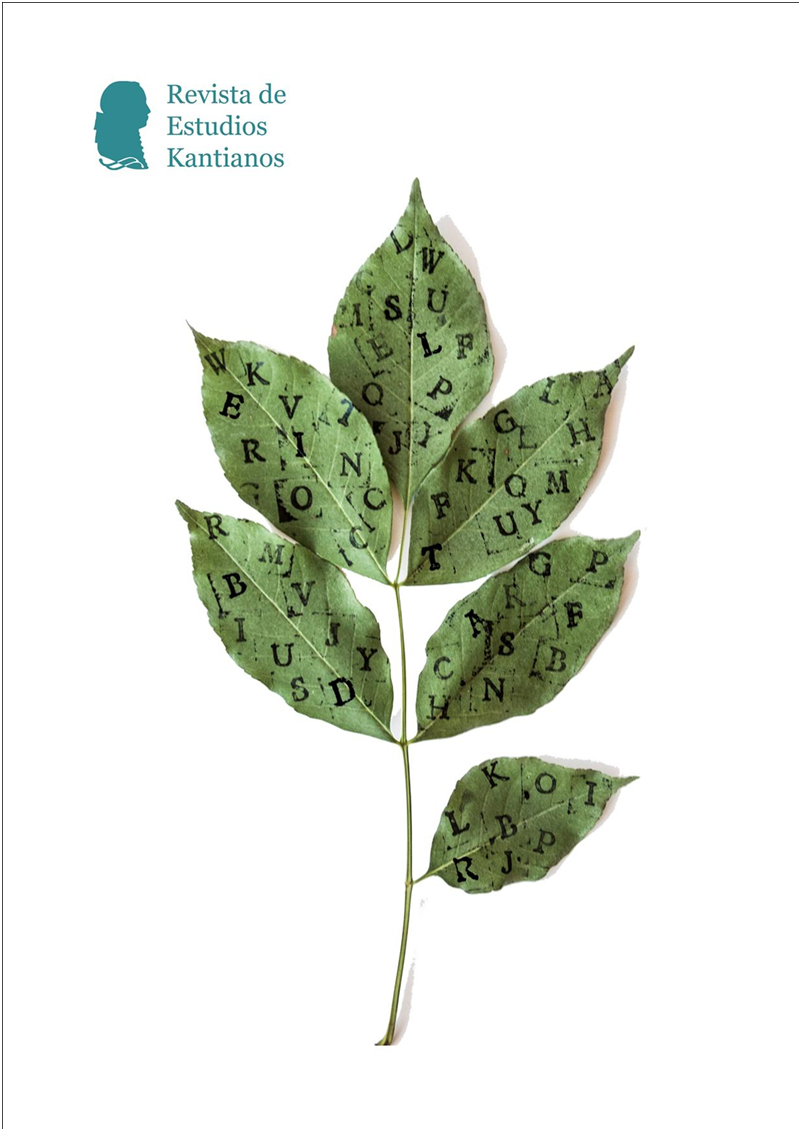Objetividad y significado en los juicios analíticos
DOI:
https://doi.org/10.7203/REK.9.1.28156Palabras clave:
Significado lógico, objeto en general, verdad formal, analiticidad, referencia Resumen
Resumen
Si los juicios analíticos se entienden solo en función de la relación de inclusión conceptual entre sujeto y predicado, debe sostenerse que no tratan sobre objetos y, por tanto, que no tienen significado. En este trabajo muestro que, para Kant, los juicios analíticos sí tratan sobre objetos, en concreto, sobre el objeto en general, y que, si bien no se les puede asignar significado objetivo, se les debe asignar significado lógico.
 Descargas
Descargas
 Citas
Citas
Allison, H. (2004). Kant’s Transcendental Idealism. An Interpretation and Defense (2a ed. revisada y aumentada). Yale University Press.
Gram, M. S. (1980). The Crisis of Syntheticity: The Kant-Eberhard Controversy. Kant-Studien, 71.
Heckmann, H.-D. (1981). Was ist Wahrheit? Eine systematisch-kritische Untersuchung philosophischer Wahrheitsmodelle. Winter.
Lu-Adler, H. (2013). The Objects and the Formal Truth of Kantian Analytic Judgments. History of Philosophy Quarterly, 30, 117-193.
Nolan, J. P. (1979). Kant on Meaning: Two Studies. Kant-Studien, 70, 113-130.
Oroño, M. (2022). Kant and the objective, logical and transcendental meaning of the categories. Estudos Kantianos [EK], 10(1), 185. https://doi.org/10.36311/2318-0501.2022.v10n1.p185
Paton, H. J. (1936). Kant’s Metaphysic of Experience: A Commentary on the First Half of the «Kritik der reinen Vernunft». George Allen & Unwin.
Proops, I. (2005). Kant’s Conception of Analytic Judgment. Philosophy and Phenomenological Research, 70, 588-612.
Rödl, S. (2006). Logical Form as a Relation to the Object. Philosophical Topics, 34, 345-369.
Rosenkoetter, T. (2008). Are Kantian Analytic Judgments About Objects? En V. Rohden, R. R. Terra, G. A. de Almeida, & M. Ruffing (Eds.), Recht und Frieden in der Philosophie Kants: Akten des X. Internationalen Kant-Kongresses (Vol. 5, pp. 191-201). Walter de Gruyter.
Shaffer, J. (1962). Existence, predication, and the ontological argument. Mind, 283, 307-325.
Steinbüchel, T. (1913). Das Wahrheitsproblem bei Kant. En J. Geyser (Ed.), Studien zur Geschichte der Philosophie: Festgabe zum 60. Geburtstag Clemens Baeumker (pp. 393-415). Aschendorff.
Straulino, S. (2021). Concepto de un objeto en general y categorías en Kant. Anales del seminario de historia de la filosofía, 38(1), 79-89.
Tolley, C. (2007). Kant´s Conception of Logic [Doctoral]. Universidad de Chicago.
Vanzo, A. (2012). Kant on Truth-Aptness. History and Philosophy of Logic, 33, 109-126.
Vigo, A. G. (2015). Kategoriale Synthesis und Einheit des Bewusstseins. Zu Kants Lehre vom Verhältnis zwischen Wahrnehmung und Erfahrung. En R. Enskat (Ed.), Kants Theorie der Erfahrung (pp. 169-200). De Gruyter.
Descargas
Publicado
Cómo citar
-
Resumen116
-
PDF51
Número
Sección
Licencia
![]()
Los autores que publican en esta revista están de acuerdo con los siguientes términos:
- Los autores conservan los derechos de autor y garantizan a la revista el derecho de ser la primera publicación del trabajo al igual que licenciado bajo una Creative Commons Attribution License que permite a otros compartir el trabajo con un reconocimiento de la autoría del trabajo y la publicación inicial en esta revista.
- Los autores pueden establecer por separado acuerdos adicionales para la distribución no exclusiva de la versión de la obra publicada en la revista (por ejemplo, situarlo en un repositorio institucional o publicarlo en un libro), con un reconocimiento de su publicación inicial en esta revista.
- Se permite y se anima a los autores a difundir sus trabajos electrónicamente (por ejemplo, en repositorios institucionales o en su propio sitio web) antes y durante el proceso de envío, ya que puede dar lugar a intercambios productivos, así como a una citación más temprana y mayor de los trabajos publicados (Véase The Effect of Open Access) (en inglés).








